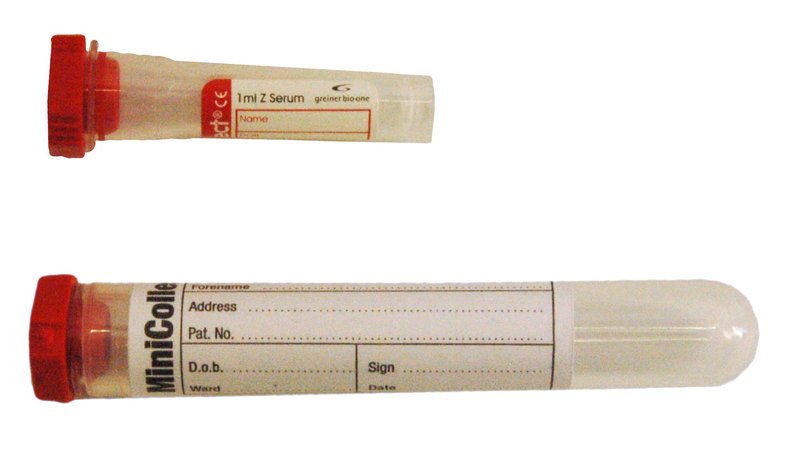Valproate
Chemical Pathology
Notes
- Valproic acid (valproate) is used in the treatment of myoclonic seizures and generalised absence seizures. It is also effective in general and partial epilepsy.
- Valproate is also used in the treatment of bipolar disorder.
- Most authorities agree that routine monitoring is not necessary and measurement is only appropriate to assess total non-compliance.
Sample requirements
For adults, blood taken into a plain gel tube

For children, blood taken into a 3.5 mL paediatric serum tube

For neonates, blood taken into a Paediatric serum tube

Storage/transport
Send at ambient temperature to the laboratory. If unavoidable, samples can be refrigerated overnight.
Required information
Valproate is not routinely available. Please contact the Duty Biochemist prior to requesting and provide relevant clinical details, including the reason for the request.
Turnaround times
Samples are sent for assay to King's College Hospital with results expected back within 1 week.
Therapeutic range
- Results are reported in mg/L without a therapeutic range. Definitive data to support the original tentative range of 50 - 100 mg/L are not available despite the frequency with which this is quoted.
- Studies indicate that plasma concentrations are no better guide to clinical response than is the dose.
- Most authorities agree therefore that routine monitoring is unhelpful. There is a crude correlation with the likelihood of CNS toxicity when concentrations exceed 100 mg/L although many patients tolerate much higher concentrations with benefit.
- Levels consistently above 140 mg/L with therapeutic failure suggest an alternative anticonvulsant should be considered.
- Despite the kinetics being the same, a range of 50 - 125 mg/L is adhered to in psychiatry with monitoring performed to document tolerance to treatment on initiation of therapy with less frequent monitoring once therapy established.
- Levels are generally performed to assess total non-compliance.
Further information
To learn more about valproate visit Lab Tests Online
Page last edited: 02/11/2018